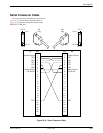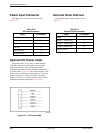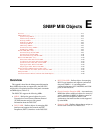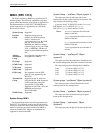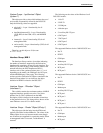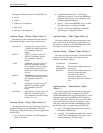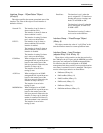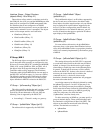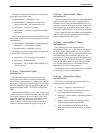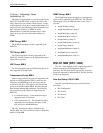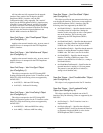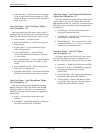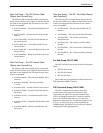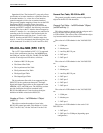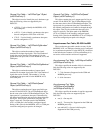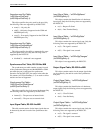
SNMP MIB Objects
E-73160-A2-GB21-50 January 1997
The following objects are defaulted if not specified in
the set PDU used to add a route.
• ipRouteMetric1 – Defaulted to 1 hop.
• ipRouteMetric2 – Defaulted to current slot for
carrier devices and –1 for standalone devices.
• ipRouteType – Defaulted to indirect.
• ipRouteMask – Defaulted as specified in the MIB
description.
The following objects are unused in the DSU/CSU and
setting them will have no effect on the operation of the IP
implementation.
• ipRouteMetric3, ipRouteMetric4, ipRouteMetric5 –
Defaulted to –1 as specified in the MIB.
• ipRouteNextHop – Defaulted to 0.0.0.0.
The following read-only objects must not be specified
in the set PDU used to add a route.
• ipRouteProto – Set to netmgmt(3) by software.
• ipRouteAge – Defaulted to 999.
• ipRouteInfo – Set to OBJECT IDENTIFIER {0, 0}
since it is unused.
IP Group – “ipRouteDest” Object
(ipRouteEntry 1)
The ipRouteDest object serves as the index to the
routing table. Since indexes for tables must be unique,
only one route per destination may appear in the table. To
ensure that no duplicate destinations appear in the routing
table, the ipRouteDest object of the ipRouteTable will be
treated as described in RFC 1354 (IP Forwarding Table
MIB):
“The destination IP address of this route. An entry with
a value of 0.0.0.0 is considered a default route. This object
may not take a Multicast (Class D) address value. Any
assignment (implicit or otherwise) of an instance of this
object to a value x must be rejected if the bitwise
logical–AND of x with the value of the corresponding
instance of the ipForwardMask object is not equal to x.”
IP Group – “ipRouteIfIndex” Object
(ipRouteEntry 1)
When the routing table is displayed, the ipRouteIfIndex
object for some entries may have a value greater than
ifNumber. In these cases, the ipRouteIfIndex refers to a
proprietary interface which is not currently implemented
by the interface group of MIB II. Route entries with an
unrecognized ipRouteIfIndex value should not be deleted.
When setting this object via SNMP, the ipRouteIfIndex
value can only assume an appropriate value of ifIndex
defined for the particular device type.
IP Group – “ipRouteMetric2” Object
(ipRouteEntry 4)
The following values are displayed for the
ipRouteMetric2 object. For a carrier device designated as
the IP Bus Master, ipRouteMetric2 is used to designate
the slot number of the next hop associated with this route
if the destination is not connected to the device. For
carrier devices not designated as the IP Bus Master or IP
Bus Master devices in which the destination is connected
to the device, ipRouteMetric2 contains the slot number
(0–15) of the carrier device. For standalone devices,
ipRouteMetric2 is not used and contains –1.
When adding a route to the routing table using SNMP,
do not specify a value for ipRouteMetric2.
IP Group – “ipRouteProto” Object
(ipRouteEntry 9)
This object is a read-only object and may have the
following values in the DSU/CSU.
• other(1) – Temporary route added by IP.
• local(2) – Route added or modified as a result of
user configuration via the front panel.
• netmgmt(3) – Route added or modified by means of
an SNMP set.
• icmp(4) – Route added or modified by Internet
Control Management Protocol (ICMP).
• rip(8) – Route added or modified by Routing
Information Protocol (RIP) (or similar proprietary
protocol).



